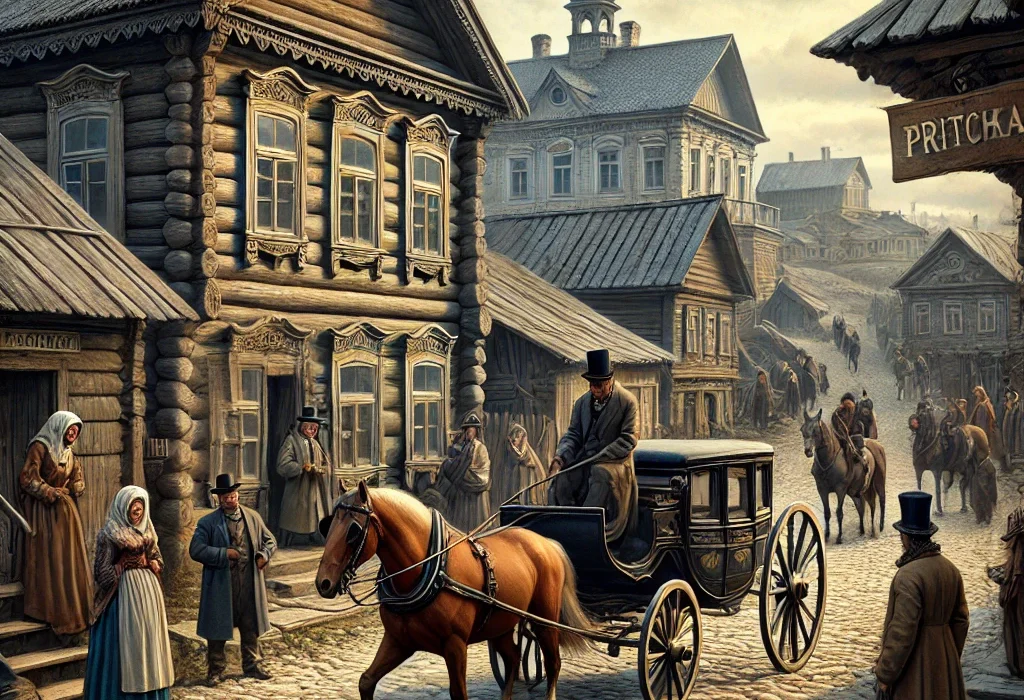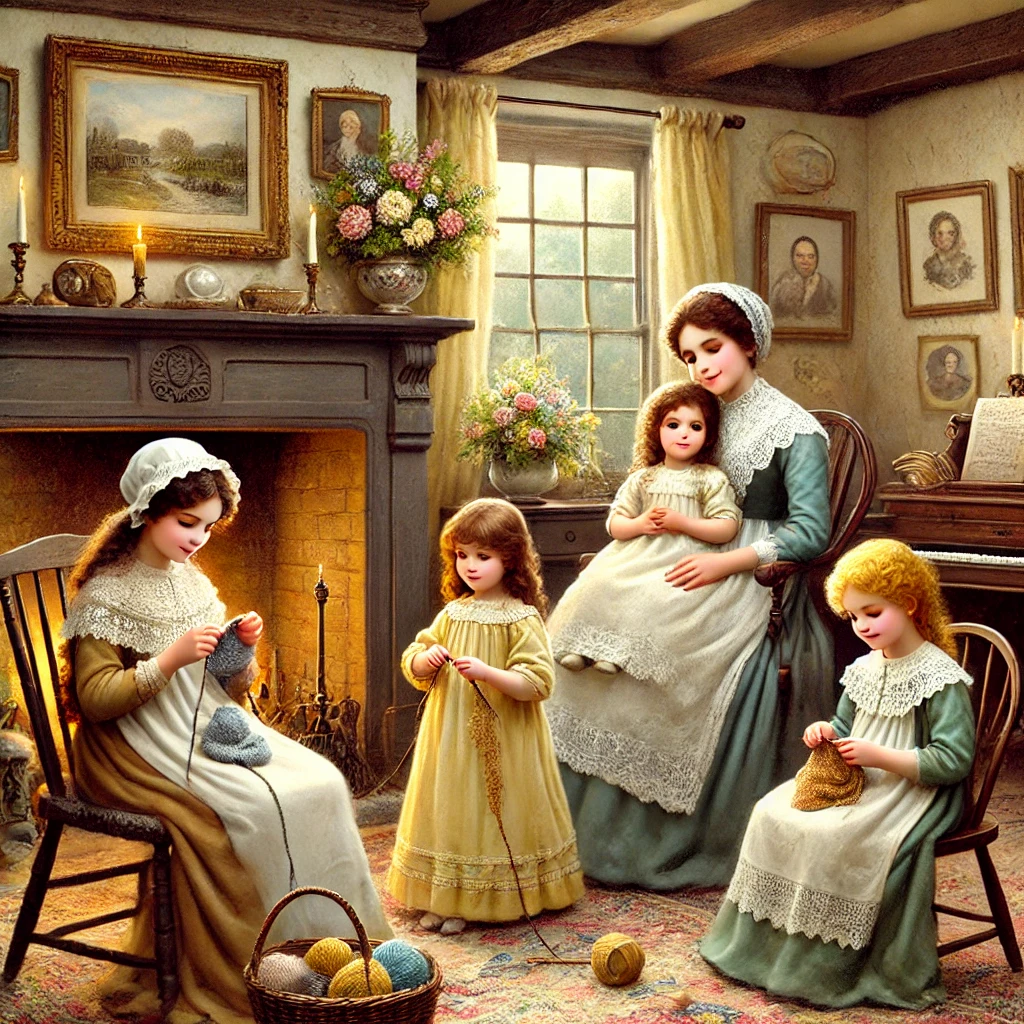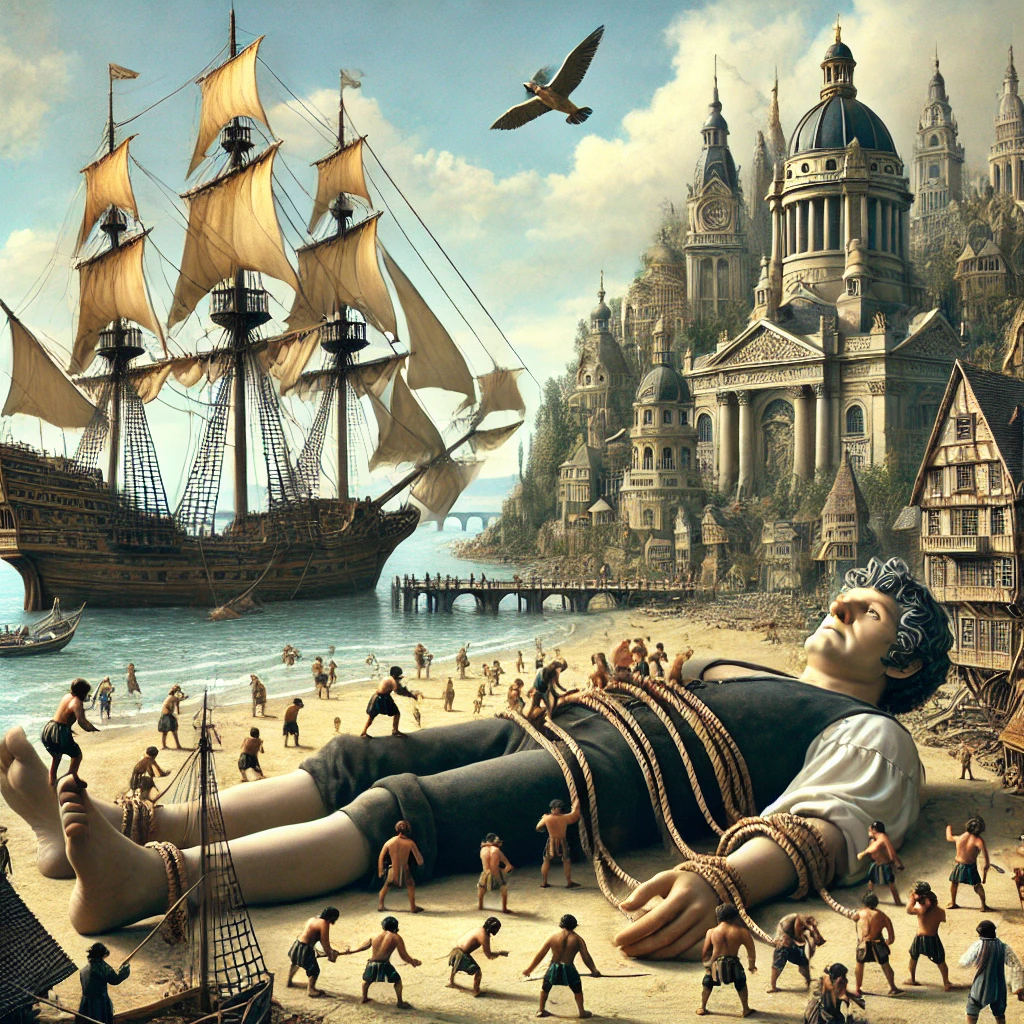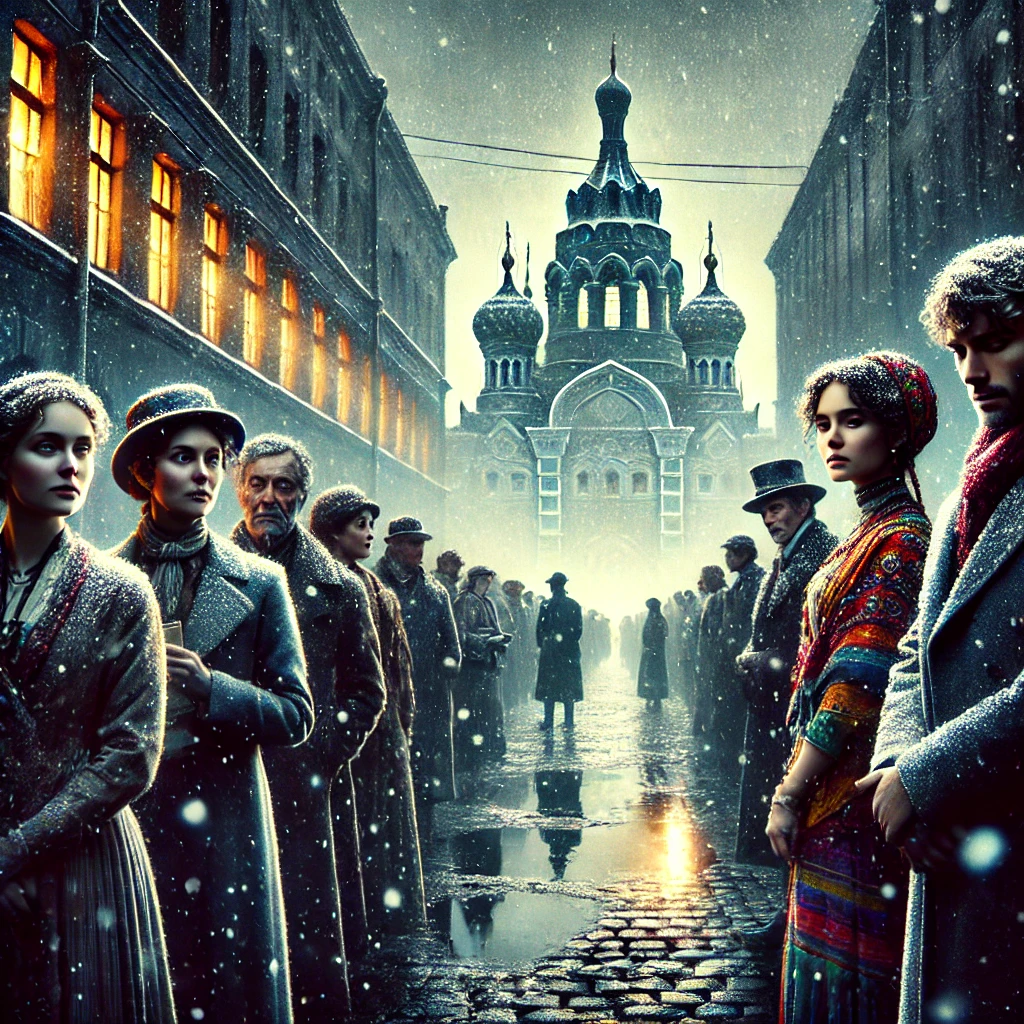Dead Souls, written by Nikolai Gogol and published in 1842, is a satirical novel that critiques the moral and social decay of Russian society during the early 19th century. The novel centers on the journey of the cunning protagonist, Pavel Ivanovich Chichikov, who travels through provincial Russia with a curious scheme: buying the legal ownership of deceased serfs, or “souls,” to present himself as a wealthy landowner. Gogol’s Dead Souls combines elements of comedy, realism, and biting social critique to explore the absurdities of bureaucratic life, the emptiness of material wealth, and the moral failings of the Russian aristocracy.
Plot Summary
On a quiet day in the provincial town of N., a man named Pavel Ivanovich Chichikov arrived in his modest carriage. He was neither remarkable in appearance nor demeanor—neither too old nor too young, neither too stout nor too thin. His arrival stirred little interest, but Chichikov was not the type to crave attention. His mission was singular: he intended to acquire dead souls—serfs who had died but were still registered as alive in government documents. Through this curious scheme, Chichikov hoped to gain wealth and status by mortgaging these non-existent souls as if they were living workers.
Chichikov began his journey by visiting several landowners. His first stop was the estate of Manilov, a dreamy, sentimental man whose days were spent lost in idle thoughts. Manilov greeted Chichikov with great warmth and enthusiasm, as though they were old friends. His estate, though vast, was poorly managed, a reflection of Manilov’s disconnection from reality. Over a meal, Chichikov delicately broached the subject of acquiring Manilov’s deceased serfs, explaining that it would relieve Manilov of unnecessary tax burdens. Manilov, ever eager to please and without much practical sense, agreed to the odd transaction without hesitation. The papers were signed, and Chichikov left the estate with the first of many dead souls.
His next visit took him to the estate of Sobakevich, a gruff, blunt man who saw the world in practical, animalistic terms. Sobakevich was shrewd and not easily fooled, but he, too, was willing to part with his dead serfs for a modest sum. Unlike the dreamy Manilov, Sobakevich took a grim satisfaction in the transaction, treating it like a regular business deal. Chichikov left Sobakevich’s estate with a larger haul of souls, content that his plan was progressing smoothly.
Chichikov then encountered Nozdryov, a flamboyant and reckless gambler, whose estate was in disarray, much like the man himself. Nozdryov, never one to miss an opportunity for mischief, quickly sensed that Chichikov was up to something unusual. Instead of agreeing to the deal, he tried to trick and manipulate Chichikov, offering to sell him the dead souls through a rigged game of cards. The situation became chaotic, with Nozdryov alternately laughing, threatening, and cajoling his guest. Chichikov wisely withdrew, sensing that dealing with Nozdryov could lead to trouble.
Undeterred, Chichikov next visited the estate of Plyushkin, an old miser whose estate had fallen into ruin. Plyushkin’s hoarding was legendary, and his once-great estate was now a pitiful sight, cluttered with useless items and inhabited by few living souls. Plyushkin had long lost any semblance of human warmth, and his only concern was saving money. When Chichikov proposed buying Plyushkin’s dead serfs, the miser eagerly agreed, seeing the opportunity to make a profit from those who no longer existed. Plyushkin’s contribution was the largest yet, further inflating Chichikov’s list of souls.
With these transactions completed, Chichikov’s standing in the town began to rise. People started to talk about the mysterious visitor, assuming that he must be a man of great wealth and importance to be purchasing so many serfs. His charm and polished manners helped him gain favor with the local elite, including the Governor, who invited Chichikov to social gatherings. At one such event, Chichikov impressed the townspeople with his knowledge and conversation, further cementing his image as a wealthy and respectable landowner.
However, as Chichikov’s reputation grew, so did the suspicions of a few astute individuals. Rumors began to circulate about his dealings, and some townspeople started to question why he was so interested in acquiring dead souls. The gossip reached the ears of the authorities, and soon enough, the legal implications of his activities drew attention. Chichikov, who had been careful to maintain a low profile, found himself at the center of an investigation. His once-flattering portrayal of a landowner with vast holdings began to unravel as people dug deeper into his background.
The situation reached a boiling point when Nozdryov, always eager to stir trouble, spread wild stories about Chichikov’s shady business. The town, already suspicious, became fully convinced that something was amiss. In a dramatic turn, Chichikov was summoned by the authorities to explain his actions. Faced with mounting pressure, he realized that his scheme had spiraled out of control. Though his dealings had been technically legal, the social and political consequences were too great to ignore.
Rather than face the humiliation of being exposed, Chichikov fled the town under the cover of night, taking with him whatever profits he had managed to secure. His carefully crafted image of respectability was shattered, leaving behind only whispers and speculation about the man who had come and gone so swiftly, leaving chaos in his wake. As he traveled away from the town, Chichikov reflected on his failure. His grand plan to climb the social ladder through deception had collapsed, revealing the hollowness of his ambitions.
As Chichikov journeyed on, leaving behind the wreckage of his schemes, the people he had encountered returned to their ordinary lives, each reflecting different facets of Russian society. Manilov would continue to live in his daydreams, Sobakevich would remain as pragmatic as ever, and Plyushkin would descend further into his isolated misery. In the end, Chichikov’s plan to accumulate wealth and status by exploiting the dead revealed not just his personal flaws but the deeper moral rot within the society he sought to deceive. His pursuit of dead souls, both literal and metaphorical, left him with nothing but the remnants of his lost integrity, adrift in a world as hollow as the souls he had sought to claim.
Main Characters
Pavel Ivanovich Chichikov: The protagonist, Chichikov is a former bureaucrat who embarks on a morally dubious plan to purchase dead serfs in order to improve his social standing and fortune. He is shrewd, manipulative, and embodies the corrupt values that Gogol criticizes. Though likable at times, Chichikov’s ambitions drive him to deceit, reflecting the novel’s broader commentary on moral decay.
Manilov: A dreamy and complacent landowner, Manilov is polite and amiable, but lives in a state of lazy idealism. His estate is poorly managed, and his lack of practical engagement in life reflects the passive and romanticized thinking Gogol satirizes. Manilov is more interested in abstract ideas than practical realities.
Sobakevich: In contrast to Manilov, Sobakevich is a blunt and pragmatic landowner, known for his rough manners and straightforwardness. He sees the world cynically and often compares humans to animals. Though shrewd, his crudeness reflects the coarseness and greed Gogol observes in society.
Nozdryov: A lively but dishonest character, Nozdryov is known for his excessive gambling, drinking, and lying. His reckless nature makes him a disruptive force, and he represents the unrestrained, chaotic aspects of Russian provincial life.
Plyushkin: Plyushkin is an old miserly landowner who hoards wealth and lives in squalor despite owning a large estate. He represents the extreme end of material greed and moral degeneration, highlighting the spiritual emptiness of the wealth-obsessed.
Theme
Corruption and Greed: The novel’s central theme is the moral corruption that stems from greed and the pursuit of wealth. Chichikov’s scheme to buy “dead souls” symbolizes the dehumanizing effects of capitalism and materialism, where people are reduced to property and wealth is pursued at the expense of morality.
The Absurdity of Bureaucracy: Gogol portrays the Russian bureaucratic system as inefficient and corrupt, mocking the excessive paperwork, pointless regulations, and the general incompetence of government officials. Chichikov navigates this system with ease, exploiting its flaws for his own benefit, which highlights the absurdity and dysfunction of institutions meant to serve the people.
Social Status and Identity: Throughout Dead Souls, characters are obsessed with social rank, titles, and appearances. Chichikov’s plot revolves around creating an illusion of wealth and respectability by acquiring dead serfs on paper, showing how easily identity can be manipulated in a society where status is prized over substance.
Human Frailty and Hypocrisy: Gogol delves into the weaknesses and contradictions of his characters, who often display hypocrisy, laziness, and greed. Whether through Manilov’s dreamy inefficacy, Sobakevich’s crude materialism, or Plyushkin’s miserliness, Gogol’s characters are all flawed in ways that reflect the broader societal ills he critiques.
The Soul as a Metaphor: The idea of “souls” is central to the novel’s deeper meanings. The literal transaction of dead souls becomes a metaphor for the spiritual death of the characters and the soullessness of the society they represent. Gogol’s use of the soul raises existential questions about what it means to live morally and with integrity in a corrupt world.
Writing Style and Tone
Gogol’s writing in Dead Souls is characterized by a blend of satire, vivid imagery, and a narrative voice that often shifts between comic detachment and moral commentary. His prose is rich in descriptions of people, places, and absurd situations, often exaggerating them to highlight their flaws. The novel’s tone oscillates between humor and melancholy; while much of the narrative is comedic, mocking the ridiculousness of bureaucracy and the pettiness of the provincial gentry, it also contains moments of moral reflection that carry a weight of sadness and disillusionment. Gogol’s style is known for its use of irony and grotesque details, creating a world that is at once familiar and surreal.
In terms of narrative techniques, Gogol frequently breaks the fourth wall, directly addressing the reader, offering moral lessons, or digressing into philosophical musings. This technique allows Gogol to explore the deeper implications of the story beyond its surface events, turning what could be a simple farce into a rich exploration of human nature and society.
We hope this summary has sparked your interest and would appreciate you following Celsius 233 on social media:
There’s a treasure trove of other fascinating book summaries waiting for you. Check out our collection of stories that inspire, thrill, and provoke thought, just like this one by checking out the Book Shelf or the Library
Remember, while our summaries capture the essence, they can never replace the full experience of reading the book. If this summary intrigued you, consider diving into the complete story – buy the book and immerse yourself in the author’s original work.
If you want to request a book summary, click here.
When Saurabh is not working/watching football/reading books/traveling, you can reach him via Twitter/X, LinkedIn, or Threads
Restart reading!








